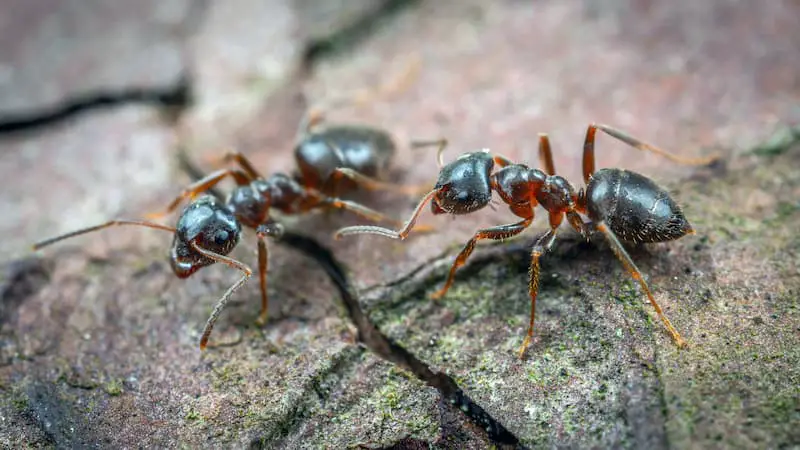As the weather warms up, you may have noticed some unwelcome guests making themselves at home – ants. Those tiny invaders can quickly turn into an infestation if left unchecked.
But before you reach for harsh chemicals to get rid of ants, give some potent home remedies a try.
With few basic household ingredients, you can whip up surprisingly effective, all-natural ant repellents and killers right in your own kitchen.
1. Get Rid of Ants With Borax
You’ve probably heard of the dreaded “sugar ant trap,” but borax takes that concept and turns it into an ant-killing power combo. This is one of my favorite eco-friendly methods to get rid of ants, and it’s remarkably effective when done right.
This mineral salt is surprisingly lethal to ants when ingested, yet it has low toxicity for humans and fur babies. Here’s the genius part – the worker ants can’t resist the sugary borax bait and bring it straight back to the colony to share.
Try this easy recipe:
- 1⁄2 cup white sugar
- 1 1⁄2 tbsp borax powder
- 1 1⁄2 cups warm water
Mix it all up until dissolved, then pour the liquid into shallow containers or caps near ant trails. You can also make a thicker, stickier bait with a sugar-borax-corn syrup paste. Just keep it out of reach of curious kids and pets!
As the worker ants feast on the bait, that borax slowly starts decimating the entire colony from the inside out by messing with their digestive system.
It may take a few days to kick in, but your patience will be rewarded when you witness the disappearance of the ants. A must try if you want to get rid of ants quickly and naturally.
2. Ground Black Pepper

Here’s a quick trick using something you likely have in your spice rack – black pepper! These dried peppercorns pack a powerful ant-repelling punch.
Simply sprinkle a thick line of powdered black pepper anywhere you’ve spotted ants roaming. That strong, irritating scent completely masks their trail so they lose the path to your kitchen.
You can also use other potent spices like cinnamon or chili powder the same way to get rid of ants.
For an easy chili spray, soak a few dried chilis in water overnight, strain out the peppers, and fill a spray bottle with that spicy liquid. Give any ant-infested areas a few liberal spritzes to send those pests packing.
FYI: While DIY natural methods can be surprisingly effective, the quickest and most powerful way to get rid of ants permanently is to use a liquid ant bait which eliminates the ENTIRE colony.
This is my favorite bait, and the one I’ve had by far the most success with:
3. Peppermint Oil
Ants have an incredibly keen sense of smell, which you can use to your advantage.
Certain strong essential oils like peppermint, lemongrass, and tea tree oil are like kryptonite to those little bugs. The aroma of these substances throws their communications into chaos and drives them away from treated areas.
For a quick peppermint solution, just add 10-15 drops of peppermint essential oil to a spray bottle filled with water.
Give that mixture a good shake, then spritz it liberally along countertops, baseboards, windowsills – anywhere you’ve noticed ant activity. You can reapply every few days to keep that fresh, minty barricade going strong.
Another deterrent method is soaking cotton balls in undiluted peppermint oil and leaving them near suspected ant entry points.
The smell is so intense and overpowering that it creates a no-ant’s-land those invaders won’t dare cross. Bonus – besides getting rid of ants, your home will smell like a delightful candy cane wonderland!
4. Fresh Coffee Grounds

Here’s a clever, zero-waste way to repurpose something you’d normally toss out – used coffee grounds!
After brewing your morning Joe, simply sprinkle those damp grounds around any areas where you’ve noticed the ants congregating, like near pet food bowls or along window sills.
You can also pack coffee grounds into a tight line to barricade any cracks or crevices where ants are slipping in.
Just make sure to refresh your grounds every few days before they dry out and lose their bitter potency.
5. Vinegar to Get Rid of Ants Completely Naturally
Who doesn’t love a good multi-purpose cleaner that can also pull double duty as an ant deterrent?
The sour, acidic smell of vinegar helps erase and mask any ant scent trails that were drawing those bugs into your home.
Just mix equal parts white vinegar and water in a spray bottle, give it a good shake, and liberally spray the solution along countertops, floors, windowsills – really any place where you’ve noticed ant activity.
Avoid using vinegar on porous stone surfaces like granite though, as it could cause etching or discoloration.
For an extra-strength anti-ant barrier, you can actually just spray straight vinegar. While it’s got a pretty potent smell, that’s exactly what makes it such a powerful deterrent to ants.
The key with any vinegar spray is reapplying it regularly, as the smell will slowly dissipate over time. Set a reminder to do a bi-weekly respritz around known ant hangouts and entryways.
6. Diatomaceous Earth
This soft powder is formed from crushed fossils and works by absorbing the oils and fats from an ant’s exoskeleton. Imagine ant “dandruff” until they slowly dehydrate and perish.
To quickly get rid of ants, sprinkle a thick line of diatomaceous earth across any ant trails, windowsills, or cracks where you see them entering. Reapply after it gets disturbed.
Be sure to use proper protective gear like gloves and a mask when dispersing powders to avoid inhalation.
7. Oil of Lemon Eucalyptus to Keep Ants Away
The oil derived from the gum eucalyptus tree, known as oil of lemon eucalyptus or OLE is one of nature’s most potent repellents.
This isn’t to be confused with standard lemon eucalyptus essential oil, which is made from the plant’s leaves.
OLE is extracted from the aromatic gum resin of the eucalyptus tree itself. It contains a naturally occurring compound called PMD that’s been registered by the EPA as a biochemical insect repellent safe for use around humans.
Numerous studies have shown OLE to be remarkably effective at repelling a wide variety of biting insects like mosquitoes, ticks, flies, and yes – even those pesky ants we’re trying to get rid of.
8. Cornstarch
Cornstarch is harmless on its own, but when ants walk through it, their tiny bodies quickly turn that powder into an immobilizing paste that clogs up their exoskeleton.
I like to sprinkle some cornstarch in ant-prone areas, then go back and give it a light misting with a spray bottle of water.
9. Baby Powder

Talcum powder combines the confusion of a strong scent with the potential to suffocate. The distinct smell of baby powder masks ant trails while simultaneously clogging up their respiratory system if you sprinkle it directly onto them. Draw a thick powder line at potential entry points or around baseboards.
Remember to reapply after things get disturbed and to use proper safety precautions when dispersing any powder substance.
10. Boric Acid
Remember how we used borax in an ultra-sugary bait to get rid of the whole ant colony? Well, there are some other enticing, sweet homemade ant baits that those little scavengers just can’t resist.
The key is creating an irresistible treat that worker ants will hungrily take back to share with the rest of the colony, ultimately leading to their demise. Just be sure to keep these well away from kids and pets!
One of the most effective is a boric acid bait trap. Like borax, boric acid is low in toxicity for humans but causes severe digestive issues for ants that ingest it.
Here’s an easy boric acid bait recipe:
Mix together:
- 3 parts white sugar
- 1 part boric acid powder
- Just enough water to form a thick, syrupy paste
To get rid of ants, scoop small dollops of this deadly sweet paste into shallow lids or containers. Place these bait traps near ant trails and high activity areas.
11. Windex
Windex acts like a quick-kill insecticide because of its key ingredient, ammonia. Ants breathe through tiny holes on their bodies called spiracles. When doused with Windex, the ammonia disrupts their respiratory system, essentially drowning them.
This can be effective for eliminating a visible cluster of ants, but it doesn’t address the root of the problem – the ant colony.
One benefit of using Windex is that it cleans the surface where the ants were crawling.
This helps remove pheromone trails, which ants use to communicate and navigate. While this temporary disruption might slow them down, it won’t deter them permanently.
Remember that Windex contains ammonia, which can be harmful if mishandled. Avoid contact with eyes and skin, and never ingest it. Keep Windex out of reach of children and pets.
12. Citrus Peel

Another smart bait uses common citrus peels, which surprisingly contain a compound called D-limonene that’s toxic to ants.
After peeling an orange, lemon or grapefruit, don’t toss those aromatic rinds! Instead, strategically place the peels near ant trails or nests. The scent will help mask their trail while the chemical slowly poisons ants that snack on it.
Just be patient, as baiting and poisoning an entire colony through ingestion is a slow process. Those resilient ants have survived for millions of years, after all.
13. Neem Oil Spray
Neem oil is an incredibly effective natural insecticide derived from the neem tree. When combined with a few household ingredients, it becomes a force to be reckoned with against all sorts of pests – including ants, aphids, mites and more.
Here’s the neem oil spray recipe:
- 1-2 tsp neem oil concentrate
- 1 cup warm water
- 1-2 drops dish soap
Shake vigorously before using, and spray it directly onto ant colonies, trails and problem areas. That bitter neem oil coats their bodies and ultimately kills them within a few days of exposure.
14. Tea Tree Oil Spray: Natural Ant Repellent
This potent spray uses tea tree essential oil, which many people swear by for its insect-repelling and eliminating properties.
Simply mix:
- 5-10 drops of tea tree oil
- 1 cup warm water
Give it a shake and liberally spray this solution onto ant trails, into crevices, and anywhere else they’re gaining access. The pungent tea tree aroma sends ants into scattering panic while also killing off their entire colony over time.
Reapply regularly for full effectiveness.
15. Ground Cinnamon
One of the easiest ways to use cinnamon is to simply sprinkle a thick line of the powdered spice around ant entry points like doorways, windowsills, or cracks in the foundation. The powder creates an intense scent barrier that ants will likely not cross. You can also use whole cinnamon sticks laid across common ant trails and hangouts.
For longer-lasting protection, make a potent cinnamon oil solution by steeping several cinnamon sticks in a carrier oil like olive, coconut or even cheap vegetable oil. Allow it to sit for at least a week, shaking occasionally, so the spicy-sweet cinnamaldehyde fully infuses into the oil.
Then, simply dip a cotton ball or swab into that fragrant cinnamon oil and wipe it along baseboards, under appliances – anywhere you see ants coming and going. Reapply every week or two as the smell starts to fade.
One important note: if you have a nest inside your home, cinnamon is less likely to work.
The Wrap-Up
As you can see, dealing with pesky ants doesn’t require resorting to toxic, chemical-laden insecticides from the store.
Mother Nature has given us a plethora of natural, affordable, and safe solutions right in our homes! From scattering coffee grounds to brewing up botanical insecticide sprays, you’ve officially got an entire arsenal to wage war on ant invasions.












